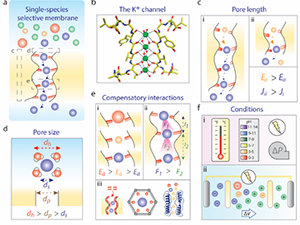Towards single-species selectivity of membranes with subnanometre pores
 Nature Nanotechnology 2020, 15,426–436
Nature Nanotechnology 2020, 15,426–436
The abstract reads as follows: Synthetic membranes with pores at the subnanometre scale are at the core of processes for separating solutes from water, such as water purification and desalination. While these membrane processes have achieved substantial industrial success, the capability of state-of-the-art membranes to selectively separate a single solute from a mixture of solutes is limited. Such high-precision separation would enable fit-for-purpose treatment, improving the sustainability of current water-treatment processes and opening doors for new applications of membrane technologies. Herein, we introduce the challenges of state-of-the-art membranes with subnanometre pores to achieve high selectivity between solutes. We then analyse experimental and theoretical literature to discuss the molecular-level mechanisms that contribute to energy barriers for solute transport through subnanometre pores. We conclude by providing principles and guidelines for designing next-generation single-species selective membranes that are inspired by ion-selective biological channels.
This work was supported by the Center for Enhanced Nanofluidic Transport (CENT), an Energy Frontier Research Center funded by the US Department of Energy, Office of Science, Basic Energy Sciences under award no. DE-SC0019112.
https://www.nature.com/articles/s41565-020-0713-6
